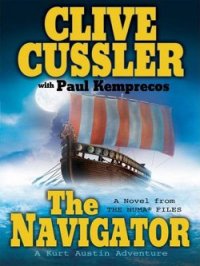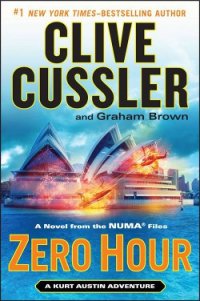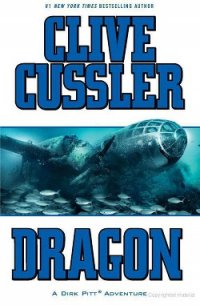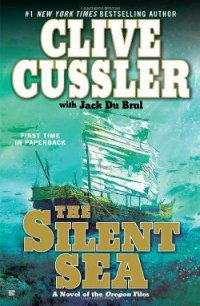White Death - Cussler Clive (библиотека книг бесплатно без регистрации .TXT) 📗
Therri stared in disbelief at the man who had pursued Austin on the dogsled. There was no mistaking the ruined face and the body that looked as if it had been pumped up on steroids. She knew ex- actly who Jesse meant when he talked about the 'evil one.' The man swept his eyes over the new prisoners, sending chills along Them's spine as his coal-black eyes lingered on her body. Jesse Nighthawk instinctively stepped back with the other villagers.
A brutish grin crossed the man's face as he saw the fear he in- spired. He uttered a guttural command. The guards shoved Thern, Ryan and Mercer out of the building and marched them through the woods. Therri was completely disoriented. She had no idea where the lake was. If by some miracle she had the chance to escape, she wouldn't know which way to run.
Her confusion was further compounded seconds later. They were moving along a paved path toward a thick stand of fir trees that barred their way like a dark and impenetrable wall. The fat trunks and thickly grown branches were a shadowy interplay of blacks and grays. When they were yards away from the nearest trees, a section of forest disappeared. In its place was a rectangle of blinding white light. Therri shielded her eyes. When they adjusted after a moment, she saw people moving about as if she were looking through a door- way into another dimension.
They were herded through the door into an enormous, brightly lit space hundreds of feet across, and vaulted by a high, rounded ceil- ing. She looked behind her as the rectangle of forest vanished, and she realized that they had stepped into a building masked by a clever camouflage. While the structure itself was an architectural wonder, what caught their breath was the huge silvery-white airship that took up a good portion of the space inside the dome.
They gazed up in astonishment at the torpedo-shaped leviathan that was longer than two football fields. Its tail tapered down to a point that was surrounded by four triangular stabilizing fins, giving it a streamlined appearance despite its enormous size. Four massive engines in protective nacelles hung from struts below the belly of the aircraft. The airship rested on a complicated system of fixed and mov- able gantries. Dozens of men in coveralls swarmed around and over the airship. The air echoed with the sound of machinery and tools. The guards nudged the prisoners forward under the rounded nose of the airship, which loomed overhead as if it could crush them at any second. Therri had a fleeting image of what a bug must feel like just before a shoe comes down.
A long, narrow control cabin, ringed by big windows, was set into the aircraft's belly a short distance back from the nose, and they were ordered inside. The roomy interior reminded Therri of a ship, com- plete with its spoked wheel and binnacle. A man stood inside giving orders to several others. Unlike the guards, who all looked as if they had sprung from the same mold, he was tall and his skin looked as if it had been bleached. His head was shaved bald. He turned at the arrival of the prisoners and looked at them through dark sunglasses then handed off the electronic clipboard he was holding.
"Well, well, what a pleasant surprise. SOS to the rescue." He smiled, but his voice had all the warmth of a wind blowing off a gla- cier.
Ryan responded as if he hadn't heard the taunt. "My name is Mar- cus Ryan, the director of Sentinels of the Sea. This is Them Weld, our legal counsel, and Chuck Mercer, SOS operations director."
"There's no need to go through the routine of name, rank and se- rial number. I know perfectly well who you are," the man said. "Let's not waste time. In the white-man's world, I go by the name of Fred- erick Barker. I'm called Toonook by my own people."
"You and these others are Eskimos?" Ryan said.
"Ignorant people call us by that name, but we are Kiolya."
"You don't fit the stereotype for an Eskimo."
"I've inherited the genes of a New England whaling captain. What started as a humiliating liability has enabled me to pass myself off in the outside world without question, to the benefit of the Kiolya."
"What is this thing?" Ryan said, glancing above his head.
"Beautiful, isn't it? The Nietzsche was secretly built by the Ger- mans to go to the North Pole. They planned to use it for commercial flight. It was all fitted out to take on passengers who would pay any- thing to fly aboard a real polar explorer. When it crashed, my peo- ple thought it was a gift from heaven. In a way, they were right. I've spent millions in restoration. We made improvements in the engines and their carrying capacity. The gas bags were replaced with new ones that can hold millions of cubic feet of hydrogen."
'I thought hydrogen went out with the Hindenburg,') Mercer said.
'German airships safely traveled thousands of miles using hydro- gen. I chose it because of the weight of my cargo. Hydrogen has twice the lifting power of helium. By the means of this simplest of atoms, the People of the Aurora Borealis will achieve their rightful destiny."
"You're talking in riddles," Ryan said.
"Not at all. Legend has it that the Kiolya were born in the aurora, which the Inuit tribes fear as a source of bad luck. Unfortunately, you and your friends will soon learn that this reputation is well-earned."
"You intend to kill us, don't you?"
"The Kiolya don't keep prisoners beyond their usefulness."
"What about the villagers?"
"As I said, we don't keep prisoners."
"Since we're doomed, why not indulge our curiosity and tell us where this aviation antique fits in."
A cold smile crossed the pale lips. "This is where the hero plays on the villain's vanity, hoping for the cavalry to arrive. Don't waste your time. You and your friends will live only as long as I need you."
"Aren't you interested in learning what we know about your plans?"
In answer, Barker said something in a strange language, and the leader of the guards stepped forward and handed him one of the C- 4 explosive packets that Mercer had carefully prepared. "Did you in- tend to do some mining?"
Ryan shot back. "Hell no! We planned to sink your operation like you did our ship."
"Blunt and to the point as usual, Mr. Ryan. But I don't think you'll get the chance to ignite your little July Fourth display," he said, his words dripping with contempt. He tossed the explosives to his hench- man. "And exactly what do you know about our 'operation'?"
"We know all about your experiments with biologically modified fish."
"That's only part of my grand plan," Barker said. "Let me explain what the future holds. Tonight, this airship will rise into the sky and head east. Its holding tanks will be filled with genetically modified fish in several species. It will spread my creations in the sea like a farmer planting seed. Within a few weeks and months, the native species will be wiped out. If this pilot project succeeds, as I expect it will, similar seedings will take place in all the world's oceans. In time, most of the fish on the world market will be those produced through our patented gene banks. We will have near-total monopoly."
Ryan laughed. "Do you really think this crazy scheme will work?"
"There's nothing crazy about it. Every computer model points to a resounding success. The natural fish stocks are doomed from over- fishing and industrial pollution, anyway. I'm simply hastening the day when the oceans are turned into vast fish farms. Best of all, throwing fish into the sea isn't even against the law."
"Killing people is against the law," Ryan said, anger in his eyes. "You murdered my friend and colleague Josh Green."




